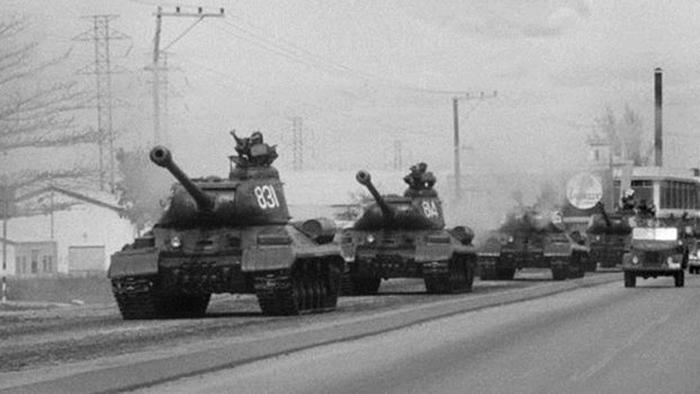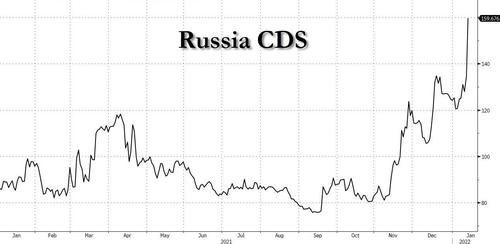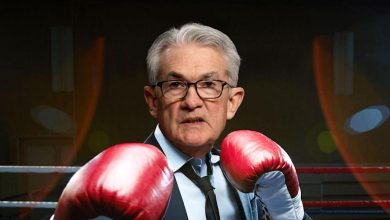Russia May Deploy Troops To Venezuela, Cuba If Tensions With US Continue To Rise

Amid stalled talks between Russia and NATO over what is effectively a novel split of Europe into geopolitical sphere of influence, Russia has decided to take the show on the road and demonstrate to the US what it feels like to be surrounded by military bases along your borders, and on Thursday, after saying talks with the U.S. over the security situation in Ukraine had stalled, Russia’s deputy foreign minister suggested that Moscow could dispatch a military deployment to Venezuela and Cuba, as the Kremlin seeks to pressure Washington to respond to its demands to halt Western military activity that it says threatens Russia.
Quoted by the WSJ, Russia’s Deputy Foreign Minister Sergei Ryabkov said that Moscow couldn’t exclude dispatching “military infrastructure” to Venezuela or Cuba if tensions with Washington, which have escalated in recent weeks over a huge buildup of Russian troops on Ukraine’s border prompting some to suggest that the odds of a war in Europe are now the highest in decades, continue to rise.
“I don’t want to confirm anything, I will not rule out anything…Depends on the actions of our American colleagues,” Ryabkov told privately owned Russian-language television network RTVi in an interview Thursday in Moscow.
Vladimir Putin “has repeatedly spoken out, including on this topic, about what could be the measures taken by the Russian navy if things go completely in the direction of provoking Russia and further increasing military pressure on us,” Rybakov said,adding that Russia didn’t want to see that outcome, but “the diplomats must come to an agreement.”
Last month, Ryabkov also told reporters that he couldn’t exclude the possibility that relations between Russia and the U.S. could end up in a situation similar to the Cuban Missile Crisis of 1962.
He also told the Russian TV station that he sees no immediate grounds for fresh talks with the U.S., after several rounds of negotiations this week yielded little progress in defusing the crisis in Ukraine.
The ominous remarks followed several rounds of futile talks this week between the West and Russia over the military buildup on the border with Ukraine. Moscow has sent more than 100,000 troops there, in response to what it says is a threat to its security from NATO states.
On Thursday, the Organization for Security and Cooperation in Europe, a 57-country grouping that helped to foster peace during the Cold War, discussed the Ukraine situation. The talks followed a U.S.-Russia meeting in Geneva on Monday and a NATO-Russia gathering in Brussels Wednesday. However, those talks also failed to resolve the crisis and the prospects for more talks have remained uncertain. Ukraine was the focus of the talks this week but wasn’t present at the negotiations in Geneva or Brussels. Thursday’s meeting in Vienna gave Kyiv a seat at the table
On Thursday, Rybakov appeared to rule out further negotiations, if Russia’s demands aren’t met.
“I am always a supporter of dialogue,” Ryabkov told RTVi, but cautioned that if negotiations end with NATO’s refusal to stop expanding this would be “to a certain extent, a dead end or a difference in approaches. I see no reason to sit down in the coming days, to gather again and start these same discussions,” he said.
Meanwhile, Russia’s representative to the OSCE, Alexander Lukashevic, said that this week’s discussions had been “really disappointing,” with the U.S., NATO and other OSCE countries not providing the “very substantial, in-depth” response to Russia’s proposals that Moscow had expected. However, Russia’s foreign minister, Sergei Lavrov, appeared to leave the door open to further talks. He said Thursday that Moscow was expecting the U.S. and NATO to respond in writing to the Russian security proposals soon.
“We still hope that the promises made in Geneva and Brussels will be kept, this is the promise to put U.S. and NATO proposals on paper,” he said.
Among its demands, Moscow wants changes to Western security arrangements linked to NATO and has expressed alarm at the prospect that former Soviet republics such as Ukraine could join NATO (hardly new – Russia has made it clear for much of the past two decades that Ukraine in NATO is unacceptable) while calling for the alliance halt its eastern expansion, demands that Western officials have rejected.
Neither the NATO meeting, which was between a Russian delegation and representatives of the 30 NATO members, nor the U.S.-Russia meeting in Geneva, reached a breakthrough in the impasse over Ukraine.
US officials say their offer of talks on military and other security issues at the OSCE is part of the clear choice they are offering Putin: On one hand, a Russian invasion of Ukraine would trigger unprecedented sanctions from the West. On the other, bilateral talks between Washington and Moscow, NATO discussions and consultations at the OSCE together offer ways out of a crisis.
“We can talk about things like military transparency, we can talk about conventional forces…We can talk about confidence building, about de-escalating tensions on the ground,” said a senior State Department official.
“So yes, we are ready to get to work. But there’s a lot of questions about whether Russia is prepared to do that.”
Russia has also demanded that NATO scale back its military activities in its members that used to be part of the former Soviet Union or the Warsaw Pact, such as Poland, Hungary and the Czech Republic.
Deputy Secretary of State Wendy Sherman, the lead U.S. negotiator with Russia on Ukraine, has said Washington is open for discussions on the placement of missiles in Europe, reciprocal steps on the size and scope of military exercises and transparency around military steps. The OSCE. which has helped keep the peace in Europe since its founding in the 1970s, is the only security-focused forum in which the key players in the current crisis—Russia, Ukraine, the U.S. and the Europeans—all have a seat at the table.
Meanwhile, after ignoring the growing geopolitical tension, the market is starting to pay attention and Russian CDS have blown out in recent days, if still far well below wides hit in march of 2020.
Source link






